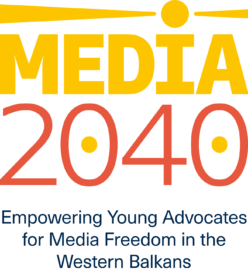| In the year 2040, professional and independent journalists enjoy safety and freedom from undue influence. Ethically utilised technology plays a pivotal role in aiding the media to fulfil its duty to the public interest, becoming the voice of citizens for a society that is well-informed, inclusive, and democratic. |
 Vizioni i medias në Ballkanin Perëndimor për vitin 2040
Vizioni i medias në Ballkanin Perëndimor për vitin 2040
![]() Vizija medija Zapadnog Balkana za 2040. godinu
Vizija medija Zapadnog Balkana za 2040. godinu
 Визијата на медиумите од Западен Балкан за 2040
Визијата на медиумите од Западен Балкан за 2040
 Vizija medija Zapadnog Balkana za 2040. godinu
Vizija medija Zapadnog Balkana za 2040. godinu
 Vizija medija Zapadnog Balkana za 2040. godinu
Vizija medija Zapadnog Balkana za 2040. godinu

- Professionalism, independence, safety and freedom of journalists:
By 2040, journalists are working in an environment free from threats, intimidation and other forms of pressures, including the ones occurring online with apparent anonymity. They operate independently, shielded from undue political and economic influence, and protected by robust legal frameworks and societal norms that uphold the value of press freedom. Strong journalist associations nurture professional conduct and solidarity, well developed journalist unions secure good working conditions, and well institutionalised and effective press councils bring back the citizens trust in media.
- Ethical utilisation of technology:
Technology in 2040 serves as a powerful tool in enhancing journalistic endeavours, and public communication in general. It is utilised ethically – respecting privacy, accuracy, and authenticity, and providing full transparency. Innovations in artificial intelligence, data analytics, and digital platforms empower journalists to uncover stories, analyse complex issues, and engage with audiences in meaningful ways.
- The role of media in serving public interest:
In 2040, the media serves as the voice of citizens, championing the public interest in its reporting, and holding power to account. Public interest is ingrained in editorial decisions, especially in the public service media that serves diverse communities. Public interest is protected by independent and efficient media regulation, with a pivotal role of independent media regulator that should secure media pluralism, ownership transparency and full respect of human rights.
- Well-informed, inclusive, and democratic societies
Through responsible reporting in the public interest, by 2040 the media fosters well-informed citizens who are empowered to make decisions, take part in public communication and campaign for public good. Formal and informal education provides knowledge, skills and competences for high levels of media literacy. The media promotes dialogue across diverse perspectives – political, ethnic or religious, and acts as a catalyst for inclusive and democratic society.
Challenges we need to overcome to reach the envisioned future
- Political parties and governments hold a firm grip over media, exerting influence on media through state funding and advertising, appointment of regulatory bodies, and slandering journalists.
- Attacks on journalists are shrinking the space of public debate by silencing critical and investigative journalists.
- (Potential of) conflict remains a constant challenge in the region and it disintegrates the communities, leading to media polarisation and spreading of hate speech.
- Brain drain is affecting the media systems as it leads to losing of young journalists and young educated consumers of quality media content.
- Poor economic situation of journalists, media and citizens affects the entire media systems. Journalism vanishes as a profession, without young people willing to pursue it. Media is oriented towards advertising and content that is easy to produce, and mostly sensationalistic. Citizens do not have sufficient means to support the media directly.
- Market monopolies have detrimental effects on public communication as they prevent diversity of views to be represented in the media.
- Artificial intelligence presents a threat to public communication, as it can be used to manipulate and misinform citizens.
- Social media accelerates information pollution (misinformation, hate speech, privacy violations) and poses challenges to the media business model.
- Citizen journalism competes with legacy journalism for audience attention, offering information that can be decontextualized, biased or polarising.
- Trust in journalists, their news and media is in decline, making citizens more prone to alternative information sources and disinformation, and leading to a decrease in political participation.
Enablers that can help us build the envisioned future
- Regulatory bodies are engaging with the issues of technology and online media, guided by the public interest, human rights principles and transparency.
- Brave and determined journalists are promoting professional standards and ethical conduct, despite the political and economic pressures.
- Well-functioning prosecution and judiciary is providing guarantees for freedom of speech.
- Mutual respect and cooperation between journalists nurtures the culture of professionalism and solidarity.
- Media literacy, introduced in formal and informal education, and promoted by the media themselves, makes citizens responsible, critical and quality-demanding news users.
- Technological developments are advancing journalism, assisting in news gathering, investigative reporting, disseminating news through multiple channels and engaging audiences in a variety of ways.
- Artificial intelligence assists journalists in performing burdensome tasks and in creation of compelling news formats and contents that attract and engage audiences.
- Social media enables media and journalists to reach different audience groups, and allows greater interaction and participation in public dialogue.
- Citizen journalism complements legacy journalism allowing for authenticity and diversity of voices in the public sphere.
- The European Union is promoting media freedom and pluralism, as well as ethical use of technology, and through the accession process provides legislative foundation and support in implementation of legislation related to media and technology.
Overcoming challenges and engaging enablers are integral to realising the vision of a vibrant, independent, and ethical media in the Western Balkans by 2040. Through concerted efforts to address pressing challenges and leverage enablers, stakeholders can work towards creating an environment where journalists can operate freely, technology is ethically harnessed, and media serves as a catalyst for inclusive and truly democratic societies.
Key takeaways about our Vision.
